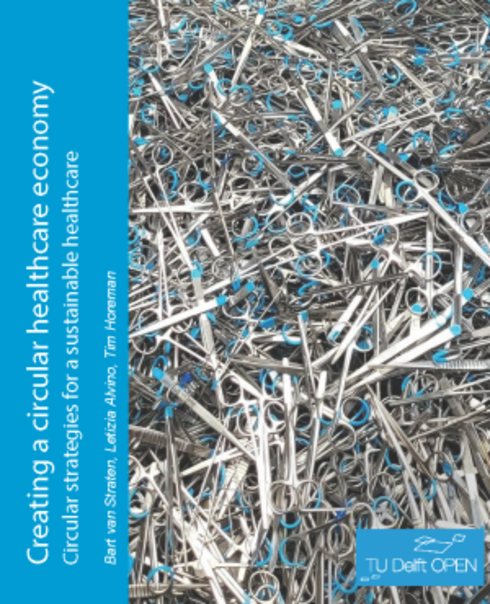
Creating a circular healthcare economy: Sustainable strategies for a circular healthcare
No ratings
Bart van Straten, Delft University of Technology
Letizia Alvino, University of Twente
Tim Horeman, Delft University of Technology
Copyright Year: 2023
ISBN 13: 9789463667302
Publisher: TU Delft Open
Language: English
Formats Available
Conditions of Use
![]() Attribution
Attribution
CC BY
Table of Contents
- About the authors
- Preface
- Acknowledgements
- Part I: Circular engineering principles
- Part II: Using (medical) waste as source for raw material
- Part III: A sustainable market
- Authors' notes
Ancillary Material
Submit ancillary resourceAbout the Book
Our world is the only planet, as far as we know, which harbors life. The number of humans on our planet has grown tremendously in recent centuries. In 1800 one billion humans occupied our earth; on 15 November 2022, this number reached 8 billion.
A result of this growth, the emissions of carbon dioxide (CO2), the primary greenhouse gas emitted by human activities, drastically increased. The increased concentrations of greenhouse gases in our atmosphere foster the long-term increase of our earth’s temperatures, also referred to as global warming.
While the earth’s population grew, so did our mass consumption society. After the Second World War humanity witnessed gigantic global economic development with great technological improvements. Computers, laptops, airplanes, tablets and Internet of Things connected humans all over the world. The hunger for plastics and steel grew as all products had to be manufactured in ever-increasing volumes. As the economy developed, our consumption grew apace.
The healthcare sector has seen the same increase of consumption. The number of patients grew, and so did the number of single-use medical products. As products become more complex and more different materials were combined., recycling became more difficult. Thus, hospitals transformed into waste factories with ever-growing waste streams. The consumption of (disposable) medical devices takes up scarce raw materials and contributes to the growing CO2 emissions.
In this book, Van Straten, Alvino and Horeman present their findings on how to create a sustainable healthcare economy by introducing different circular strategies. In 9 chapters, they present a wide variation of studies as practical cases to show what strategies and actions can be taken in order to implement sustainable strategies for a circular healthcare.
This book was written in line with the courses the authors developed at TU Extension School, the open online education edX platform of Delft University of Technology/TU Delft, a leading university in science and technology, recognized for its world-class research. This book is a manual for everyone who follows the online course ‘Circular strategies for a sustainable healthcare’, but certainly also for everyone who wants to discover more about circular strategies and wants to understand the principles and practices of circular economy and urban mining. This book is suitable for students, researchers, policymakers and practitioners in the fields of healthcare sustainability, management, business and economics.
About the Contributors
Authors
Bart van Straten is an expert in the field of sustainability and the circular healthcare economy. He is affiliated with several institutions and companies including Van Straten Medical and GreenCycl as well as educational and government-related institutions. He co-founded GreenCycl, an organization with a mission to decrease the amount of medical waste. Bart holds a doctorate in BioMedical Engineering from Delft University of Technology/TU Delft with a specialization in the circular reuse of surgical devices and surgical waste materials. During his PhD research, Bart developed a Field Lab together with Tim Horeman for experimental research on reprocessing surgical waste into new raw materials and medical products. His research has won several awards, for example in the Utrecht Circular Innovation Top 20, as builder of the world’s first recycling process for hospital waste.
Bart joined the research group Sustainable Surgery & Translational Technology led by Tim Horeman at TU Delft, where he is a lecturer on medical device prototyping and teaches several related courses. Bart focuses on integrating sustainable engineering and circular design in education as a researcher and lecturer. He has published widely on using the operating room as gold mine for new raw materials. As chairman of the Royal Dutch Normalization Institute, NEN Platform Sustainability & Medical Devices, he was involved in writing the Dutch national NEN-3 guideline for reusing single-use medical deviceswhich was published by NEN on 1 June 2020.
Letizia is Assistant Professor of Marketing at the Faculty of Behavioural Management and Social Sciences (BMS) at the University of Twente. Her expertise is in neuromarketing. Letizia investigatesthe neuronal and cognitive mechanisms that identify and define decision-making processes and buying behaviorin marketing, both B2B and B2C. In particular, she analyses and studies the biological basis underlying the buying decision process in relation to different marketing operations (e.g., branding, pricing) and product characteristics (e.g., label).
